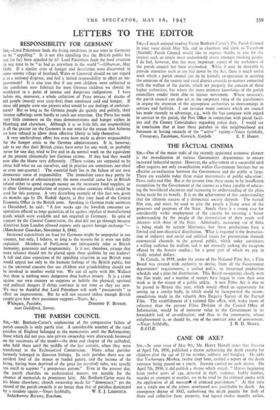THE PARISH COUNCIL
Sta,—Mr. Bonham-Carter's explanation of the comparative failure of parish councils is only partly true. A considerable number of the rural parishes of England belonged to the monasteries until the Reformation; those which did not pass into private ownership were afterwards bestowed on the successors of the monks—the dean and chapter of the cathedral, who held them until the middle of the last century, when they were transferred to the Ecclesiastical Commission. Many other parishes formerly belonged to diocesan bishops. In such parishes there was no resident lord of the manor or landed gentry, and the income of the living, having been deprived of the great (or rectorial) tithe, was usually too small to support " a prosperous parson:" Even at the present day, the parish churches on ecclesiastical manors are notable for the absence of memorials to prominent laity. Mr. Bonham-Carter must fix his blame elsewhere; church ownership made for " democracy," yet the record of the parish councils is no better than that of parishes dominated
by a resident squire.—Yours faithfully, W. E. I. LINDPIELD. Sedgeberrow Rectory, Evesham.


































 Previous page
Previous page